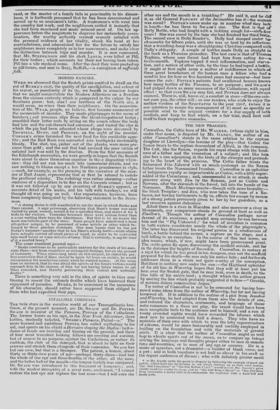MORBID FANCIES.
WHEN we observed that the Scotch prints omitted to dwell on the cut of BURKE'S coat, the quality of his smallfilothes, and colour of his cravat, or peculiarity of its tie, we begfft to conceive hopes that we might congratulate the Modern Athenians on a freedom from the vicious curiosity which is pampered in the vulgar by our Southern press : but, alas ! our brethren of the North are, it would seem, no wiser than their neighbours. On the assassina- tion of Mr. WEAR, people, we believe, first became enamoured of the memorials of murder. They made .pilgrimages to the scene of butchery ; cut precious slips from the blood-bespattered hedge ; ennobled their latter ends by sitting on the couch where the body had lain and the cut-throats had caroused ; and visited the stye in which the pig had been educated whose chops were devoured by THURTELL, HUNT, and PROBART, on the night of the murder. CORDER'S crime furnished the next food for this creditable appe- tite; and the Red Barn was converted into toothpicks inestimably bloody. The shot, too, picked out of the planks, were more pre- cious than gold ; and the soil that had covered the poor victim of satiated lust was sold by the drachm. From the first accounts of the Edinburgh enormities, we were greatly in hopes that the Scotch were about to show themselves superior to these disgusting whim- sies: they did not run too much into immaterial details, and we saw nothing to blame except a few Northern grandnesses in style, —such, for example, as the phrasing in the narrative of the mur- der of Daft Jamie, representing that at first he refused to imbibe the proffered whisky. The imbibing was rather alarming—rather ominous of a disposition to be fine on the Cowgate crimes ; but as it was not followed tip by any inventory of BURKE'S apparel, or accurate detail of his meals, and his talk with turnkeys, we still thought all was going on well. Our expectations, however, have been completely dissipated by the following statement in the Scots- /no?.
"A strong desire is still manifested to seethe dens in which Burke and Hare resided. A sage personage, observing that Hare's house was daily visited by great crowds, rented it for a specified time, and shows it for a trifle to the visitors. Yesterday forenoon there were seldom fewer than a score waiting their turn for admittance. But this is by no means the most marvellous part of the story. Some people have manifested a taste altogether unique, to be possessed of some article or other which be- longed to these peerless criminals. One man boasts that he has got Burke's hammer—another that he has Hare's whisky bottle—while others have actually carried off small pieces of wood, in order to be converted into snuff boxes or some articles of fancy. This is certainly, to say the least of it, a morbid fancy."
The same excellent journal says- " Burke continues to be particularly anxious for the death of his asso- ciate Hare—not from vindictive or revengeful feelings, but on the ground of humanity. When conversing lately on this subject, he stated his per- fect conviction that if Hare should be again let loose on society, he would recommence his murderous career when he wanted money. At the same time he declared, that he was afraid the spirits of his future victims would reproach him in the regions of bliss for not having taken means to get Hare executed, and thereby preventing their violent and untimely deaths."
There is something very odd in the idea of spirits in bliss con: tinning to resent the untimely deaths which have hastened their enjoyment of paradise. BURKE, to be consistent in the assurance of his character, should rather have supposed them obliged to those who had expedited their joys.


















 Previous page
Previous page